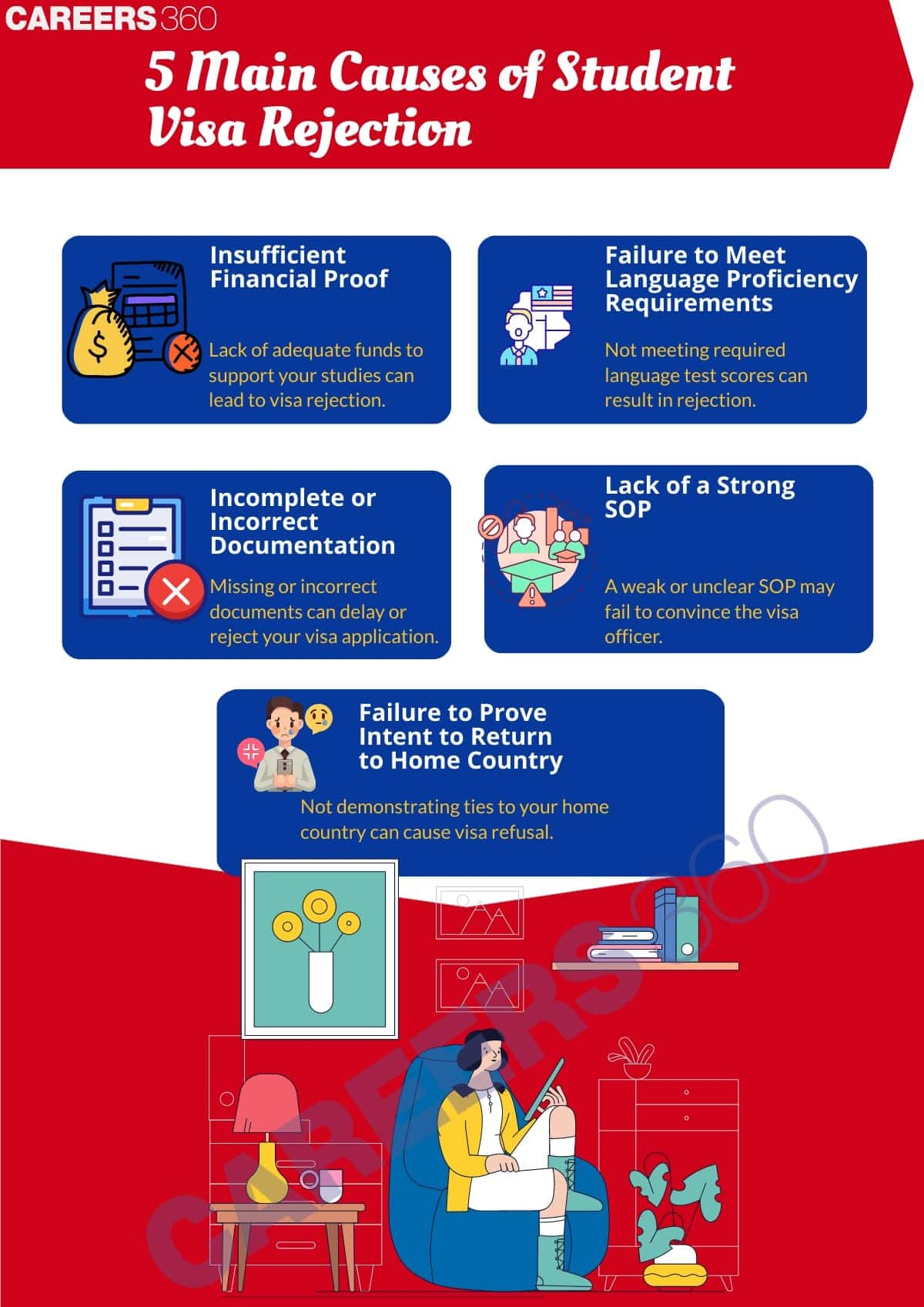5 Main Causes of Student Visa Rejection
Pursuing higher education from foreign universities is no less than a dream come true for international students, but getting a student visa is a deciding factor whether this dream becomes a reality or not. There are a lot of reasons for student visa rejections, acting as a hurdle in the path of students going abroad. Deciphering those reasons can help applicants prepare better and enhance their chances of obtaining visa approvals. In this article, we will discuss in detail about the five main causes of student visa rejections and know how to avoid them.
This Story also Contains
- Insufficient Financial Proof
- Failure to Meet Language Proficiency Requirements
- Incomplete or Incorrect Documentation
- Lack of a Strong Statement of Purpose (SOP)
- Failure to Prove Intent to Return to Home Country

Insufficient Financial Proof
One of the most common reasons why student visas get rejected is due to the shortage of financial proof. Whenever an international student decides to study abroad, they need to demonstrate that they have enough financial resources in their bank account. This is necessary to assure that they will be able to cover tuition fees, living expenses, and every other expense related to their studies. So, if an applicant is not able to provide sufficient financial documents, then their visa application gets rejected.
How can students avoid it?
To avoid it, students must ensure that they have all the necessary financial documents beforehand with all the bank statements, sponsorship letters, or scholarship details. In addition to this, they must also submit some other financial documents that are proof of stable income or show that they have support from parents or sponsors. For this, they can provide past transaction records to show that they are financially stable.
Failure to Meet Language Proficiency Requirements
Every student who wishes to study abroad needs to demonstrate proficiency in the English language. For this, they need to clear exams like IELTS, TOEFL, or PTE. If they do not meet the score requirement in that particular country, or are not able to provide a valid proof of language proficiency, then their visa application can get rejected.
How to Avoid This Issue?
Take language proficiency tests well in advance and aim for scores that meet or exceed the university and visa requirements. Make it a point to submit the test scores within a valid timeframe. If the scores are not as per the visa requirements, then consider retaking the test to score matter and meet the requirements.
Incomplete or Incorrect Documentation
Another common reason why the visas of students get rejected is because they provide incomplete or incorrect documentation. Embassies that check the visa application of students are very strict regarding the necessary documents that need to be submitted, failing which can result in visa rejection.
How to avoid this issue?
Firstly, students must check that they have all the required documents with them and see to it that they are complete. Double-check all required documents and ensure they are complete. This should be done by following all the guidelines that the embassy or consulate has provided. Seeking guidance from an experienced education consultant is a wise decision to ensure that you have prepared all the paperwork correctly.
Lack of a Strong Statement of Purpose (SOP)
In a visa approval process, it is crucial to submit a Statement of Purpose (SOP). It is important to talk about the academic goals, reasons for selecting a particular study abroad destination, and highlight the future career goals in this document. The student visa might also be rejected if the SOP is vague and fails to brief the visa officer about all these things.
How to Avoid This Issue?
Make sure to draft a convincing and clear SOP that explains your academic and professional goals. It must be consistent and align with the information that you have presented in other documents. Make sure to get in touch with an experienced mentor or consultant before you submit the SOP to avoid any mistake and visa rejection.
Failure to Prove Intent to Return to Home Country
Most of the time, the student visas get rejected because they are not able to prove that they will return to their home country after their studies are completed. Visa officers look for strong ties with the home country, like family, property or any job offer so that they understand that the student does not intend to overstay their visa.
How to Avoid This Issue?
Ensure that you clearly state the plan of returning back home after your studies get completed. Substantiate your point by giving proof of family, employment or property ties.

Frequently Asked Questions (FAQs)
The most common reasons for visa refusal are incomplete or incorrect documentation, insufficient financial proof, lack of ties to the home country, inadequate English language proficiency, and a poor interview performance.
Visa officers check a lot of things for a student visa. These include–academic records, financial records, intent to study, non-immigrant intent, personal ties, health checks, consistency, and honesty.
Yes, if your student visa gets rejected, then you can apply again. You need to pay the application fee again.
Yes, you can generally reapply for a visa even after being refused, but you should carefully review the reasons for the previous denial and address any issues before submitting a new application, ensuring your new application demonstrates significant changes in your circumstances if necessary.
Technically, you can apply for an F1 visa again as soon as a few days after receiving a rejection, as there is no mandatory waiting period.
Applications for Admissions are open.
Want to study in Ireland? Explore Universities & Courses
Study in Canada
ApplyExplore Universities, Courses & Subjects | Work while study
Study in UK
ApplyApply for upcoming intake & plan your journey
Study in USA
ApplyUniversities inviting applications | Get expert guidance
Study in Australia
ApplyShortlist best ranked universities & get expert guidance
